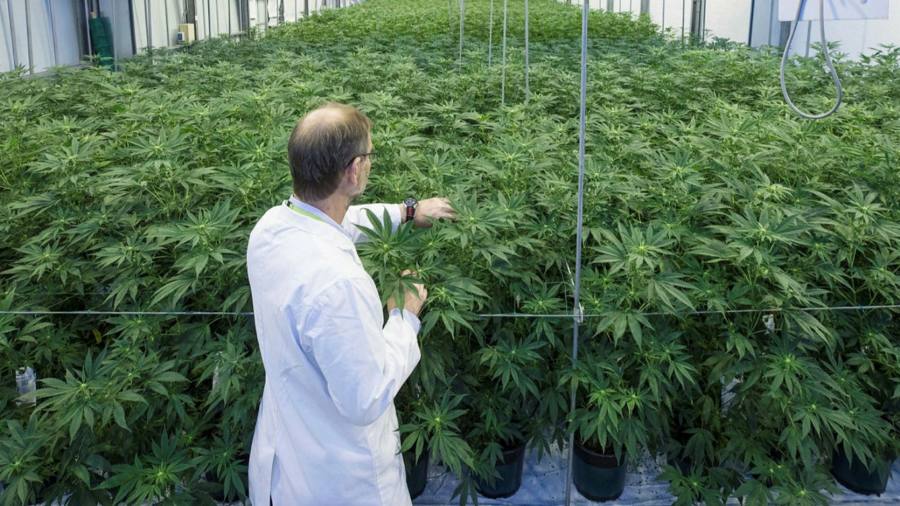[ad_1]
Two weeks ago, British cannabis medicine specialist GW Pharmaceuticals was bought by US-based Jazz Pharmaceuticals for a cool $7.2bn. Chalk one up for UK capital markets? Not so fast.
Like many pharma companies, GW was listed on the Nasdaq having abandoned London’s junior Aim market in 2016. Back then, it was valued at just £2.6bn. But it was clear the demand for its stock was across the pond, and its eventual success proved to be the UK’s loss.
It’s not hard to understand why. The Nasdaq has long been the home for listed companies with big promises and premium valuations, but little to show for it. The London Stock Exchange meanwhile, is increasingly becoming a repository for low-growth financials, miners and consumer goods companies.
For a speculative growth company, a higher share price can make a real difference. Workers are more likely to accept stock compensation in lieu of hard currency, saving cash for capital investment. While expensive equity means extra funds can be readily accessed without seriously diluting shareholders.
The rich valuations available in US markets have been too much of a temptation for Britain’s smaller companies of late. In April 2020, gambling software company GAN left Aim for a Nasdaq IPO. At the time, it had a market capitalisation of £140m. Less than a year later, US punters have put an £875m price tag on the business.
Others are following suit. The share price of life sciences company MaxCyte has risen nearly 10-fold since it announced it was seeking a dual listing in the US in early 2020, while the explosive success of biotechnology business Immunocore’s Nasdaq IPO in January will not go unnoticed by other late-stage biotech hopefuls such as the much heralded Oxford Nanopore.
Defenders of the UK markets will undoubtedly point to the success of names such as Just Eat, Ocado and Codemasters, but all of these started off as much smaller listed businesses. Would they still plump for the UK market today? It’s looking increasingly hard to make that case.
Jonathan Hill is finishing his review of the UK’s listing rules, with the final document due within weeks. Some of the ideas mooted include a smaller free-float requirement and dual-share class structures so founders can retain control.
But given the US can offer all of these, plus a steady line of punters who will pay for growth at double-digit multiples of revenue, it’s hard to see how the UK stops its budding tech names taking a trip past Ellis Island in search of financial glory.
Smith & Nephew: bumps and bruises
Pharma and biotech are booming thanks to the pandemic, but spare a thought for the medical devices industry which has been hit hard by lockdowns over the past year. Smith & Nephew, a £15bn group, is no exception, writes Andrew Whiffin.
Delays to non-emergency surgery meant underlying revenues at the joint-replacement and wound-dressing manufacturer fell 12 per cent to $4.5bn in 2020.
Margins were even weaker, falling 8 percentage points to 15 per cent on an ebita basis. The company said it expected them to be disappointing again this year. Shares in the FTSE 100 group reacted with an 8 per cent fall in early trading, leaving them a quarter below their 2019 pre-pandemic peak. Even at that price, they still look fully valued at 20 times 2023 earnings estimates.
Lockdowns are a serious issue for Smith & Nephew. They stop routine medical procedures and there are fewer personal injuries because people are out and about much less. At the same time, schools closures have reduced demand at the group’s ear, nose and throat business. Renewed lockdowns in the first months of 2021 will take a similar toll.
Divisional results highlight the problem. Revenues from knee treatments were down 16 per cent annually, though hip replacement sales fell just 0.5 per cent. Pent-up demand should help post pandemic but, given the uncertainties, it is hard to say when that will kick in.
There are some signs of strength. Smith & Nephew has not needed to cut staff or use the government’s furlough scheme during the pandemic and R&D spending actually rose by $11m. Acquisitions also add to the group’s medical bag of products in ear, nose and throat, as well as shoulder replacement treatments.
While travel, leisure and the entertainment industry are sure to be beneficiaries of resurgent demand when lockdowns end, it’s unlikely to be the same for medical devices. It might take longer for Smith & Nephew’s shares to heal than the market thinks.
[ad_2]
Source link





